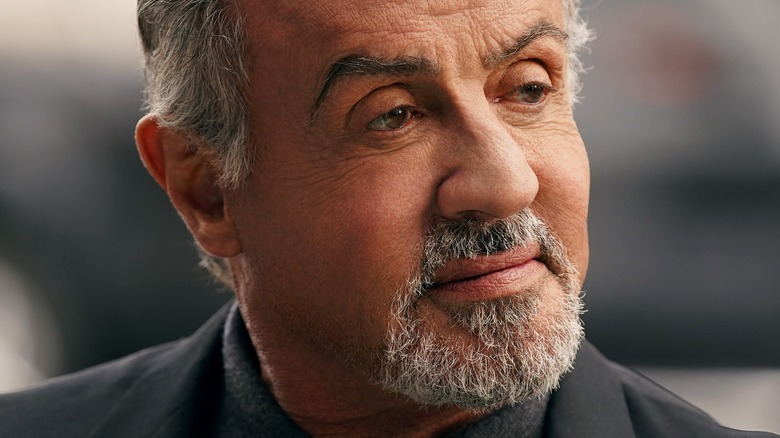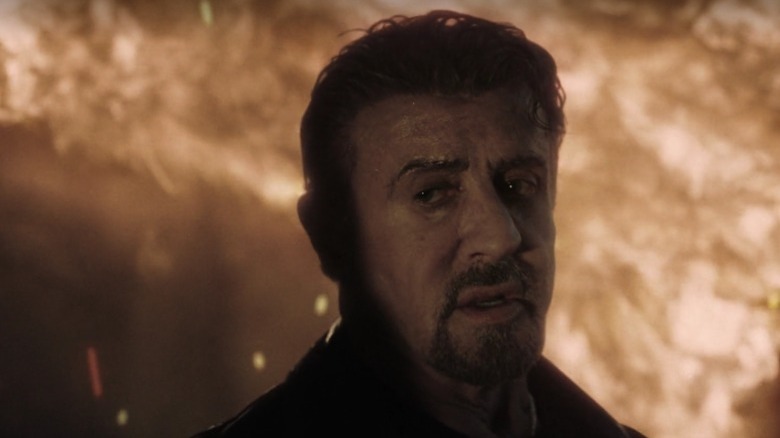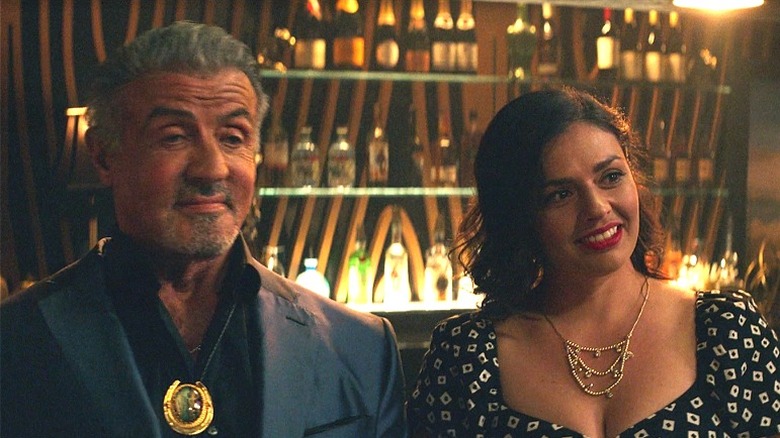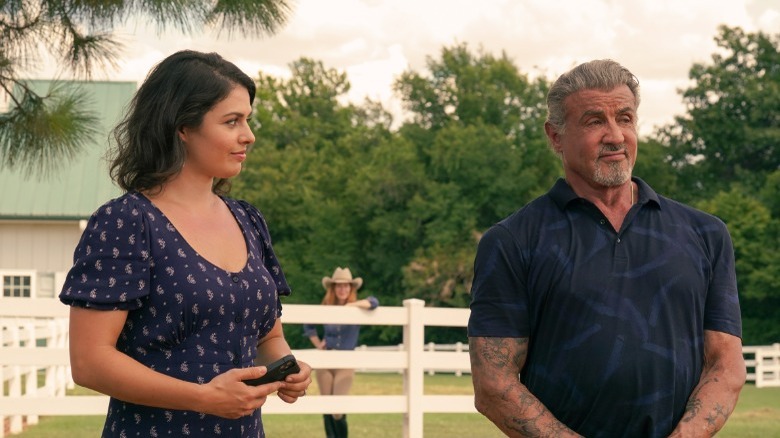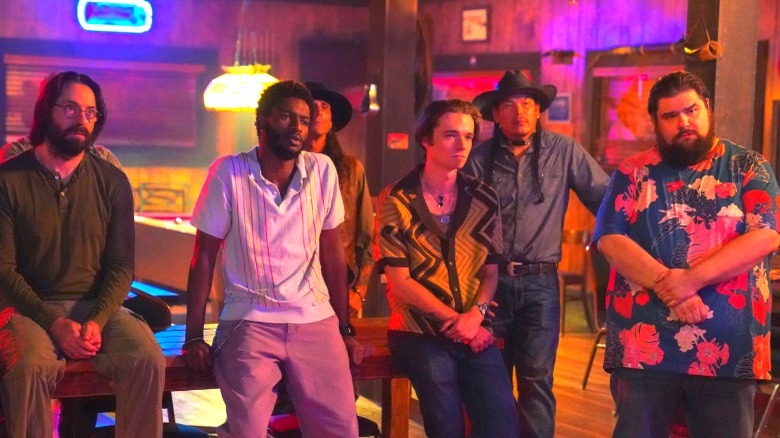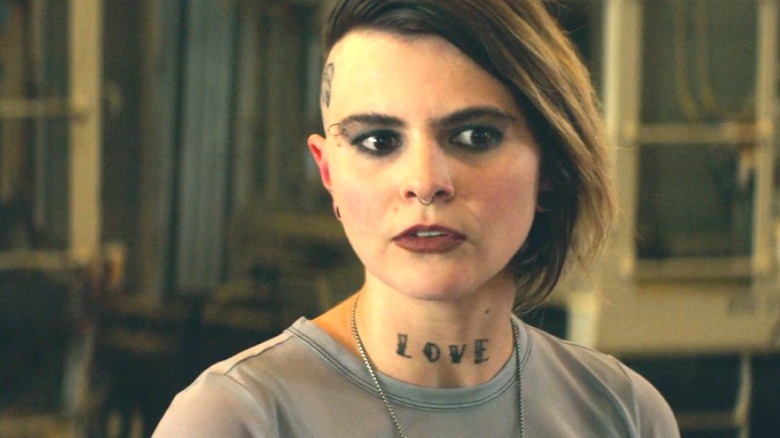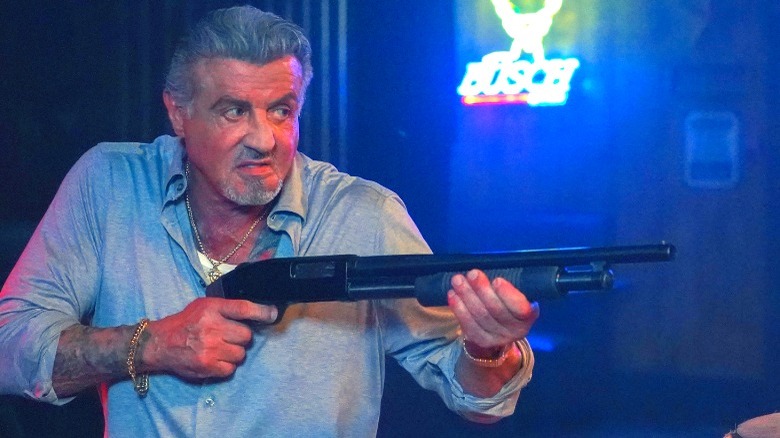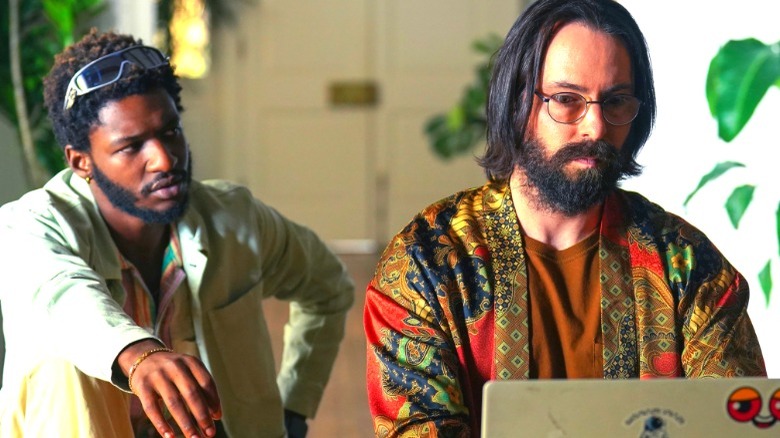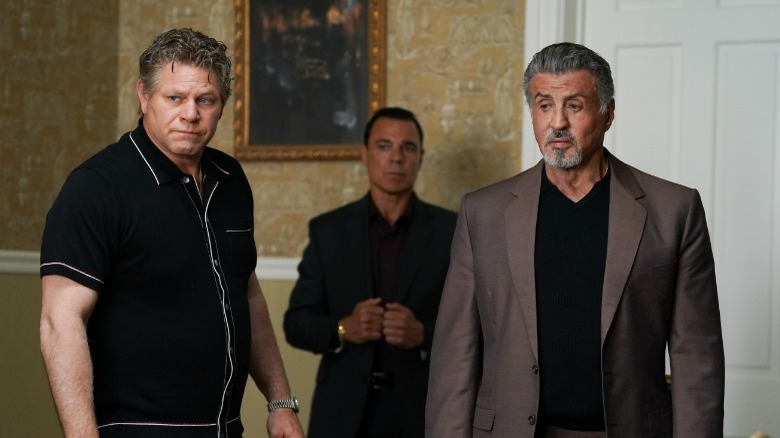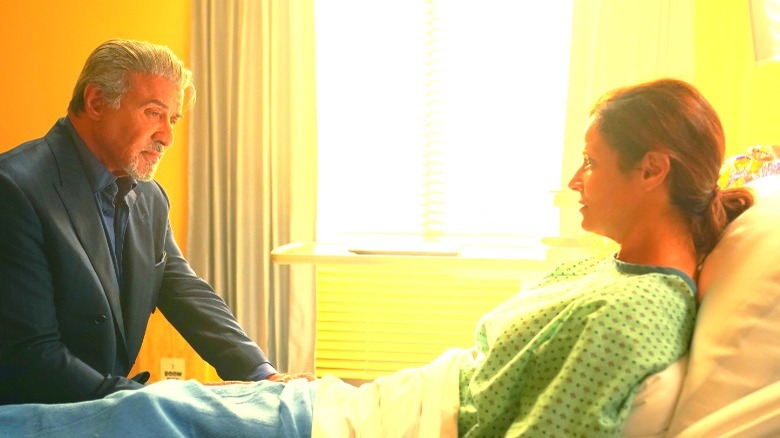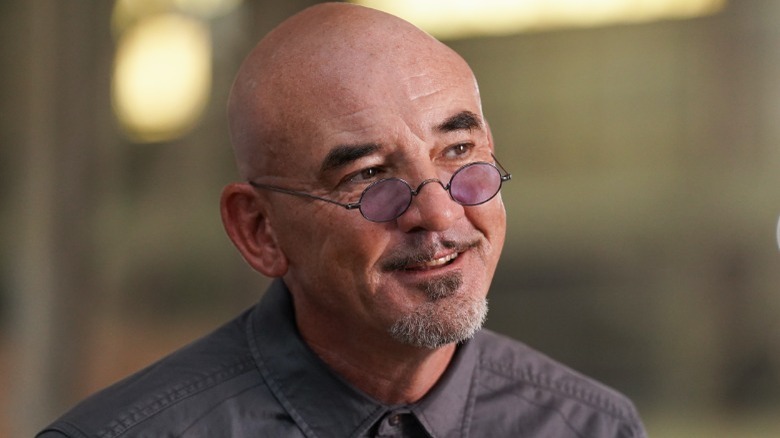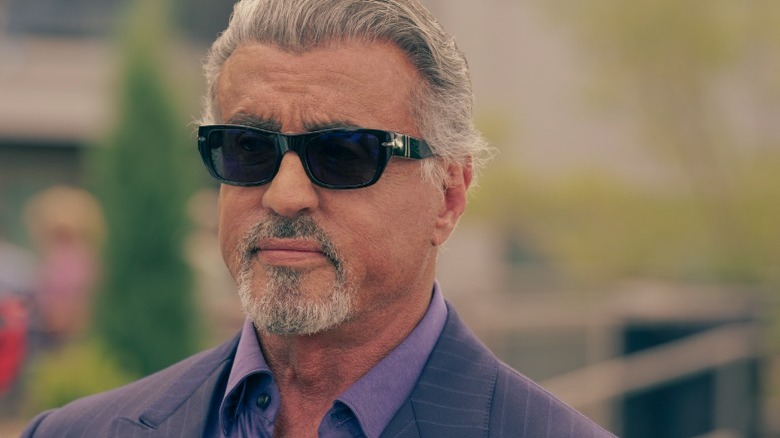The Ending Of Tulsa King Season 1 Explained
When most people think of organized crime, they generally don't think about the Midwest. However, when Dwight "The General" Manfredi (Sylvester Stallone) gets released from the slammer after serving 25 years, he learns that his post-prison assignment involves setting up shop in the land of tornadoes and trucks. Since he's great at his job, the General gets to work right away, building a crew and getting himself into the local soft drug trade.
Although the storytelling often verges on the absurd and locals feel "Tulsa King" gets a lot wrong about Tulsa, the series has already developed a loyal following thanks to its quirky characters and a strong performance from Stallone. It's a dream role for the actor, who told Empire he was once rejected by Paramount for a background role in "The Godfather" because he apparently did not look Italian enough.
From urban equines to laughing gas wars, Season 1 left viewers clamoring for more. If you love livin' on Tulsa time as much as we do, slip into your Luccheses, and let's take a closer look at the ending of "Tulsa King" Season 1.
The General's sacrifice
It's established early on that Manfredi took the rap for a mob hit, a sacrifice that cost him 25 years and the chance to watch his daughter grow up. This is one of the highest sacrifices a mobster can make, which is why the General is understandably angry when he is reassigned to Tulsa in what effectively constitutes a banishment. Although Manfredi accepts his fate, there's a sense that something has been left out, a feeling that's amplified by Chickie's (Domenick Lombardozzi) behind-the-scenes duplicity. Viewers are thrown a little morsel when Dwight later matter-of-factly reveals to Margaret Devereaux (Dana Delany) over dinner, "I killed a man. He was burning up in a building, trapped. I think I did him a favor" in Episode 7.
While this seems good enough for Madge, who cooly responds by asking him what it feels like to take someone's life, Dwight's brief tale skims over any finer points or context. However, a flashback to 1997 Brooklyn at the beginning of Episode 9 brings things into focus while also lending insight into the Chickie problem and Armand's (Max Casella) back story. The flashback finds Armand looking on helplessly as the unhinged Chickie and Vince (Vincent Piazza) sadistically torture radiator-handcuffed Invernizzi guy Ripple (David Deblinger) for a perceived wrong.
Dwight shows up just in time for Chickie, who has lost the handcuff keys, to start an accidental fire. This prompts Dwight to shoot Ripple dead to save him from the horror of burning alive and dutifully turning himself in when the police arrive. In the aftermath, Armand heads west to Oklahoma, while Chickie spends decades harboring misplaced resentment and avoiding responsibility for Ripple's death.
Casino Royale
From the moment the General arrives in Tulsa, he's hard at work trying to turn a profit. Despite losing a couple of decades in the clink, Dwight Manfredi's business sense is as sharp as ever. He immediately muscles his way into the wide world of cannabis dispensary ownership, eventually branching out into the inexplicably lucrative illicit nitrous oxide trade while onboarding new members for his local crew.
As mafiosos go, a single dispensary and a laughing gas side hustle are still relatively small-time, but Manfredi is an enterprising old chap when it comes to parting Oklahomans from their walking-around money. After realizing his favorite hangout, the Bred2Buck saloon, is on Cherokee land, Dwight convinces his pal Jimmy the Creek (Glen Gould) to help transform the place into a casino, the perfect place for turning a profit and laundering cash Marty Byrde-style.
Dwight gives Mitch (Garrett Hedlund) an offer he can't refuse by promising the bar owner can be the house band, and before you can say "Cosa nostra," they've put together a bolo-optional grand opening shindig.
Family drama
If you learn nothing else from watching mafia films, it's that family is everything to fictional mob types — which makes it that much worse when mobsters' families inevitably fall apart as they struggle with professional boundaries and difficulty finding a work-life balance.
Unlike the Corleones or the Sopranos, though, Dwight spent decades away from his family and has to start from scratch, building a relationship with his daughter, Tina (Tatiana Zappardino). Despite this, he continuously inserts himself into her life, overstepping boundaries and expecting more than he rightfully deserves from her. Dwight even gives her husband a hard time for not asking his permission to marry Tina despite the fact that wasn't involved in her life at the time they got married. Just when Dwight has finally earned back her trust, even bringing her and his grandchildren to Tulsa for a visit, he is arrested, likely bringing back a flood of difficult feelings Tina has long since moved past.
The Manfredis aren't the only family with end-of-season drama to spare. Empowered by his Gangster Dad, Tyson (Jay Will) is heading out to make his mark on the world at the tender age of twenty-something despite the protests of his devastated actual parents. Still, Chickie takes the grand prize for family drama when he gets tired of caring for his aging father and murders him in the bathtub before defiantly throwing off his wig and going full Michael Corleone at the end of "The Godfather."
The Bad News Bears
Opening any new business from the ground up and hiring a whole new team can be intimidating no matter what line of work it is. However, when that line of work is organized crime, finding and training the right crew can prove a daunting task, especially for someone who has been out of the management workforce as long as Dwight Manfredi has. Still, proving they don't call him the General for nothing, Dwight rises to the occasion.
Unlike the bland hoodlums of the Invernizzi crew, Manfredi's team comprises folks with the brains to make his operation succeed who actually like their boss and each other, creating a special kind of loyalty and magic that Chickie could never have. What they don't have is a whole lot of combat experience, which is unfortunate when Manfredi immediately gets them sucked into a war with the bikers.
To get everyone up to speed, the General conducts a training session with Mitch as his second-in-command and the efforts pay off. At the end of the season, Team Manfredi is a cohesive unit in the business world and on the battlefield, setting the stage for some pretty solid teamwork in Season 2.
Grace toughens up
When Dwight first meets the Higher Plane Marijuana Dispensary staff, they're hardly the picture of professionalism by mob standards — or otherwise. As the General first approaches the counter to pump the helpful Clint (Dashiell Connery) for information in Episode 1, Grace (McKenna Quigley Harrington) puffs away at her vape while eyeing them suspiciously from behind her phone.
After Dwight rolls the joint (pun intended) by knocking out Fred the security guard (Justin Garcia-Pruneda) and demanding to see their boss, Bodhi (Martin Starr), Grace is so stunned she seems frozen in place, telling him she is "way to f***ing high" to come out from behind the counter. Although her reaction is understandable, Grace still seems frightened when they meet for the second time at the dispensary party, telling him, "No offense, but I get triggered pretty easily," while clutching her arms in front of herself defensively.
Not content to be a bad Gen Z stereotype, though, Grace proves herself valuable when the crew trains for war with the Black MacAdams biker gang in Episode 8, effortlessly demonstrating excellent marksmanship and inspiring Dwight to call her "Jane Wayne." After revealing that she lost her father to self-inflicted gun violence, Grace demands an apology from Manfredi and gets it, reminding him to be careful with their "little just regular lives." She even gets in on the action when Black MacAdams comes calling at the Bred2Buck, taking out two of the bikers like a boss in the final episode.
Bloodbath at Bred2Buck
While a little healthy competition might be good for some business models, Manfredi's arrival on the Tulsa scene sends Black MacAdams boss and friendly neighborhood psychopath Caolan Waltrip (Ritchie Coster) through the roof. When Dwight's crew runs afoul of the bikers while schlepping nitrous at Ogallala-Land Festival, the ever-dramatic Waltrip proclaims them "a threat to our very existence." Waltrip's reps tell Tyson and Bodhi they don't have permission to sell in Black MacAdams territory, issuing a beatdown to help the message sink in and effectively declaring war between the two parties in Episode 4.
After a few minor skirmishes and a fair amount of harassment from Team MacAdams' corrupt cops, Waltrip sets up a meeting in Episode 6 to whine about how Dwight didn't ask his permission and to offer "a taste" before setting up shop. Unlike the nitrous they're selling, this goes over like a lead balloon, and the conflict continues to escalate, ultimately culminating in a full-scale assault on the Bred2Buck.
Since the General saw it coming and had his troops ready, Team Manfredi handily takes out the MacAdams meatballs in the season finale. Manfredi personally ends the drama llama Waltrip to the cool musical stylings of Phil Collins and brings the conflict to a rather bloody close.
Bodhi's secret skills
Dispensaries are fairly common in Tulsa, with local news source KTUL even reporting that there are more pot shops than gas stations in the state of Oklahoma. This is why when Dwight extorts Bodhi's place, it's almost hard to understand how easily the latter caves. However, as Season 1 progresses and Bodhi's personality and motivations gradually become more apparent, it starts to look like Manfredi is exactly what Bodhi was waiting for in life.
While Bodhi might initially come across as something of a pushover, it eventually comes to light that he's not as naive as he appears. From the beginning of their business dealings, the dispensary owner seems almost a little too casual about everything, not to mention more than willing to get on board with everything Dwight is selling. When the red dirt hippie busts out his laptop in Episode 9 and declares, "Welcome to the great chain robbery," it all starts to make a little more sense. During the casual narration of his methods to Tyson powered by knowledge from a previous tech job, Bodhi uses the Internet to strip Waltrip of his millions.
Bohdi explains, "You set up a bogus hotspot, send in a malware Trojan horse, and get unfettered access." It's a reminder that in the age of crypto criminals like Sam Bankman-Fried, modern mobsters need a lot more than muscle to stay in the game.
A new business model
After Dwight is released from doing time for Chickie Invernizzi and the family is less than appreciative, it's hard to understand why he doesn't just pull an Armand and take off. While the General has a long history of loyalty to crime boss Pete (A.C. Peterson), his last pre-prison interactions with underboss Chickie were hardly favorable. While Pete has likely more than proven his competence as leader of the crime family over the years, Chickie does little to inspire confidence with his volatile nature and poor business sense. The idea that Dwight would keep working for him after his dad's death is dubious to begin with, but when Armand reveals the family secret that Chickie tried to have Dwight killed in prison, it's the end of the road for their relationship.
Feeling pretty grandiose after executing his dad and ascending the throne, Chickie heads to Oklahoma to check out Manfredi's business in the season finale. Realizing that he's got a good thing going and has no loyalty to the Invernizzi nepo baby, Dwight tells Chickie he's "taken stupidity to a f***ing art form" before poaching his man Goodie (Chris Caldovino) and telling the boss to get on a plane and stay out of Tulsa. The move makes Manfredi the top dog of his own independent crime family, one that's ruled not by force and intimidation but by a sense of community and chosen family that's rare in the organized crime world. Long live the Tulsa King.
An act of betrayal
It's clear that Dwight Manfredi used his time in the slammer to better himself by reading literary greats. Eagle-eyed viewers who take a gander at Dwight's library in his cell during the show's pilot episode will catch Nietzsche, Shakespeare, Goethe, Robert Greene, and Mary Anne Evans among his collection, and the General later references Sun Tzu's "The Art of War." As a modern-day gentleman mobster, the General has no problem making room for a fairly complicated friends-with-benefits relationship with the hard-drinking ATF agent Stacy Beale (Andrea Savage).
Unfortunately, Beale is something of a hot mess, and her poor judgment rather quickly bleeds over into her professional life, which leads to some pretty sloppy law enforcement work and a few bad decisions that get her shot and Roxy (Emily Davis) killed.
For most of Season 1, Stacy seems more than willing to risk everything to protect Dwight -– that is, until her chickens come home to roost. When she gets shot in front of the Mayo and her relationship with the General comes to light, putting her career on the rocks, Dwight gifts her with enough money to retire comfortably –- a gift that Stacy repays him for by reporting it to her ATF bosses. If her motivations seem uneven, Andrea Savage reminds us it's because Stacy has serious alcohol addiction issues that impact her judgment. As Savage told CinemaBlend, "She's kind of just hanging on and surviving." Still, that doesn't make her betrayal any less shocking.
A new villain for Season 2
Caolan Waltrip's obsessive anti-Dwight efforts might seem a bit over-the-top, but this is precisely why he makes a decent nemesis for the General throughout Season 1. He's less of a cool and calculated criminal entrepreneur looking to turn out a healthy balance sheet and more of a mad king, while his Black MacAdams acolytes follow him without question. Waltrip also has a strange, almost charming quality about him, a quality that's seen when he sweet-talks Roxy while putting his hands around her neck to choke the life out of her. With Caolan dead after the events of "Happy Trails" and Chickie seemingly out of the picture, the end of Season 1 leaves Dwight without any clear big bad looming ahead of Season 2 –- aside from the United States government, that is.
One of the biggest questions fans will have for the coming season is who Dwight will find himself up against with the Black MacAdams out of the picture, and there are a couple of possibilities. As Sylvester Stallone observed in a Paramount+ web featurette, there was an "almost Shakespearean" quality to Chickie's ascension, and it's hard to believe we won't see more of him in the future.
There's also the looming threat posed by Stacy, who knows entirely too much about Dwight's business even if it's hard to imagine her fully committing to an anti-General agenda. Other possible "Tulsa King" antagonists for Season 2 include Margaret's ex-husband or the introduction of a new foe -– possibly someone in the ATF or even a cartel boss, given Tulsa's proximity to the Mexico-Chicago drug pipeline (via News On 6).
When does Season 2 of Tulsa King air?
Between successfully launching several "Star Trek" series, in addition to fan-favorite shows like "The Good Fight," "Evil," and Taylor Sheridan's "Yellowstone" universe, Paramount+ has proven its ability to pick a winner. Produced by Taylor Sheridan and helmed by Terence Winter of "Boardwalk Empire" fame, it's hardly surprising that "Tulsa King" has become one of the more talked-about crime dramas on television during its nine-episode entry into the streaming market. According to Deadline, the series was an instant hit, leading to its renewal after only three episodes aired.
With Dwight's crew established and a casino in the mix, the Manfredi operation is primed for expansion during Season 2. If there's anything we've learned about the organized crime business between shows like "Breaking Bad," "Ozark," and "Weeds," it's that the bigger the operation gets, the more attention it draws from other criminal enterprises and government agents alike.
Bodhi, Tyson, and Grace came a long way in Season 1, and it would be nice to see them become more assertive in Season 2 or even move into capo positions. It's likely Bodhi's wire fraud dabbling could come into play if the government doesn't crack down on him thanks to Stacy's betrayal. Dwight will need to talk his way out of some jail time, which shouldn't be too hard since Stacy is objectively off the rails, and he'll likely be spending more time getting cozy with Margaret. Tina will need to decide if she's about that Dwight life, and Chickie will need to work out whether it's worth the headache to try to continue his anti-Dwight agenda.
Either way, expect Season 2 to have more great chemistry from the General's team of lovable mafia misfits.
